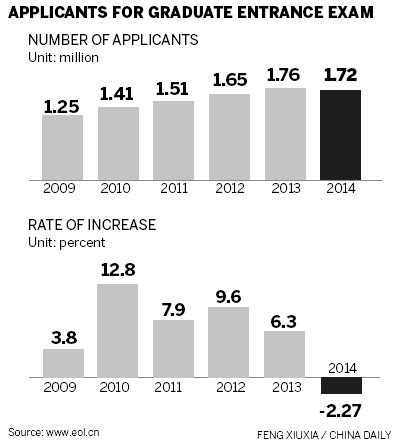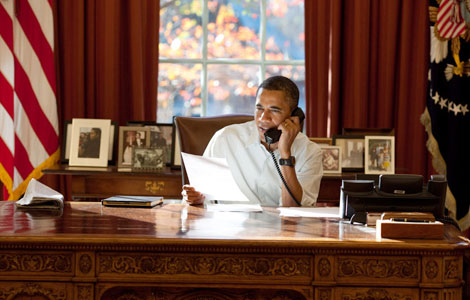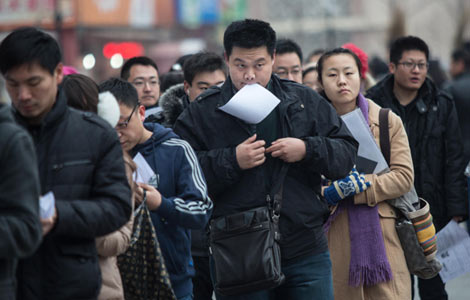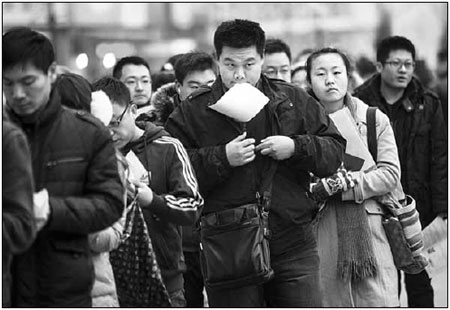Fewer candidates take graduate entrance test
Updated: 2014-01-06 07:52
By Zhang Yue (China Daily USA)
|
||||||||
End to fee-free courses blamed for lower figures
The 2014 national graduate school entrance examination, which took place over the weekend, saw a drop in the number of candidates this year.
Admission officials said the end of tuition-free postgraduate courses might be behind the decline in numbers.
The Ministry of Education said on Saturday that 1.72 million people participated in this year's examination, a decline of 40,000 from last year. It was the first drop in five years.
According to the Beijing Education Examinations Authority, about 250,000 people applied for universities in Beijing in 2014, a drop of 7.85 percent compared with 2013.
This year is the first in which free postgraduate education has been replaced with university scholarships, and the first with no age restrictions on entry.
In the past, the Ministry of Education's enrollment guide on graduate exam registration stated that, in general, applicants should be younger than 40, although there was no age limit for those willing to pay for their own tuition.
The director of the graduate admissions office at China University of Political Science and Law, who identified himself only as Li, said the tuition policy change means students may need to pay their tuition themselves if they do not win a university scholarship, but that getting a scholarship isn't difficult for good students.
"It may seem to be a financial burden for some students," he said. "But in fact, the university provides substantial scholarships for those getting good grades in the entrance exam. There is no big difference compared with previous years. Some students may misunderstand the policy, so they didn't take the exams."
Li said another reason for the decline is that the media reported in May that students that graduate from universities in the capital with a master's degree need to be younger than 27 years old to apply for a Beijing hukou, or permanent residency.
"Previously, getting a Beijing hukou by obtaining a master's degree here was a big incentive," he said. "Now, the age limits may disappoint some of those reaching or older than 27, although no official regulation has come out yet."
Li said that about 8,000 candidates applied for admission at his university in 2014. The figure was about 1,000 fewer than last year.
The number of candidates older than 40 shows no significant increase.
Chongqing Daily reported on Saturday that among the city's 38,000 candidates this year, about 100 candidates are older than 40.
"We do have people close to 40 years old applying for our university this year," Li said. "But just a few."
Cheng Yue from Haitian Education, one of the most popular private training centers for graduate entrance examinations, said that even without the age limit, "getting admitted by a good university is still no easy task for people older than 40 years old".
"A major reason is that many among this age group do not have a bachelor's degree. This means the university they applied to needs to hold additional examinations for them, including oral English and major courses. And this makes getting admitted even harder for them."
Cheng said he has not received any inquiries from students older than 40 this year.
Cai Yongming, director of the graduate admissions office at the University of International Business and Economics, told China Daily that UIBE has people older than 40 applying this year, but the office did not have specific numbers.
"Usually, students who are in their mid- to late 30s want to get into our university for a master's degree for MBA and MPA," he said. "Their working experiences, especially some entrepreneurs' experiences, can be nicely combined with the MBA and MPA courses."
Cai also said that personally, he welcomes students over 40 to study at the university, as they bring diversity in the classrooms, where students are mainly in their 20s.
The examination over the weekend was also hailed as the most difficult in recent years. Cai said that this year, all the testing centers in Beijing are required to block WiFi signals.
Cai said that the testing center at his university had 3,300 candidates over the weekend. Each student needed to pass two security checks before getting into the classroom, and their identification cards were checked twice to make sure that no one was taking the exam for another person. Two teachers acted as test monitors in each classroom, and students were not allowed to leave the classroom during each examination.
Luo Wangshu contributed to this story.
zhangyue@chinadaily.com.cn
|
Candidates for the national graduate entrance examination line up for a test at the University of International Business and Economics in Beijing on Saturday. Mao Yanzheng / China Daily |

(China Daily USA 01/06/2014 page5)

 Offices of world leaders
Offices of world leaders
 First Taiwan-born panda makes public debut
First Taiwan-born panda makes public debut
 India successfully launches heavy lift rocket
India successfully launches heavy lift rocket
 Xuelong waits for chance to break free
Xuelong waits for chance to break free
 Fewer candidates take graduate entrance test
Fewer candidates take graduate entrance test
 Frigate escorts transport of Syria chemical weapons
Frigate escorts transport of Syria chemical weapons
 Putin, Belarussian president play ice hockey
Putin, Belarussian president play ice hockey
 Federer, Hewitt to meet in Brisbane final
Federer, Hewitt to meet in Brisbane final
Most Viewed
Editor's Picks

|

|

|

|

|

|
Today's Top News
Small plane crashes in Colorado
NYC Chinatown weathers killer storm
Program helps ex-inmates find work
'Life-threatening' cold bites US Midwest
Backing out of China to reshore
China keeps Africa as a key pillar
Major corruption cases up in 2013
New grads look abroad for first jobs
US Weekly

|

|






